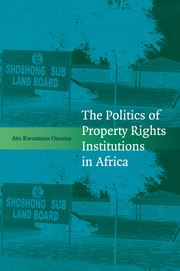Crossref Citations
This Book has been
cited by the following publications. This list is generated based on data provided by Crossref.
Pedersen, Rasmus Hundsbæk
2012.
Decoupled Implementation of New-Wave Land Reforms: Decentralisation and Local Governance of Land in Tanzania.
Journal of Development Studies,
Vol. 48,
Issue. 2,
p.
268.
Badiey, Naseem
2013.
THE STRATEGIC INSTRUMENTALIZATION OF LAND TENURE IN ‘STATE-BUILDING’: THE CASE OF JUBA, SOUTH SUDAN.
Africa,
Vol. 83,
Issue. 1,
p.
57.
Soifer, Hillel David
2013.
State Power and the Economic Origins of Democracy.
Studies in Comparative International Development,
Vol. 48,
Issue. 1,
p.
1.
Opalo, Kennedy
2014.
The long road to institutionalization: the Kenyan Parliament and the 2013 elections.
Journal of Eastern African Studies,
Vol. 8,
Issue. 1,
p.
63.
Murtazashvili, Ilia
and
Murtazashvili, Jennifer
2015.
Anarchy, self-governance, and legal titling.
Public Choice,
Vol. 162,
Issue. 3-4,
p.
287.
Markus, Stanislav
2016.
Sovereign Commitment and Property Rights: the Case of Ukraine’s Orange Revolution.
Studies in Comparative International Development,
Vol. 51,
Issue. 4,
p.
411.
Jacob, Jean-Pierre
2016.
Catherine Boone, Property and Political Order in Africa. Land Rights and the Structure of Politics.
Anthropologie & développement,
Vol. 44,
Issue. ,
p.
181.
Côté, Isabelle
and
Mitchell, Matthew I.
2017.
Deciphering ‘Sons of the Soil’ Conflicts: A Critical Survey of the Literature.
Ethnopolitics,
Vol. 16,
Issue. 4,
p.
333.
Simpson, Hannah Katherine
2017.
Justice for Sale: Political Exigency and the Development of a Legal System.
SSRN Electronic Journal ,
Hierman, Brent
and
Nekbakhtshoev, Navruz
2018.
Land reform by default: uncovering patterns of agricultural decollectivization in Tajikistan.
The Journal of Peasant Studies,
Vol. 45,
Issue. 2,
p.
409.
Côté, Isabelle
and
Mitchell, Matthew I.
2018.
The Far North Act in Ontario, Canada: a sons of the soil conflict in the making?.
Commonwealth & Comparative Politics,
Vol. 56,
Issue. 2,
p.
137.
Peyton, David
2018.
Wartime speculation: property markets and institutional change in eastern Congo's urban centers.
Journal of Eastern African Studies,
Vol. 12,
Issue. 2,
p.
211.
Murtazashvili, Ilia
and
Murtazashvili, Jennifer
2019.
The political economy of legal titling.
The Review of Austrian Economics,
Vol. 32,
Issue. 3,
p.
251.
Paller, Jeffrey W.
2019.
Democracy in Ghana.
D’Arcy, Michelle
and
Nistotskaya, Marina
2019.
Intensified local grievances, enduring national control: the politics of land in the 2017 Kenyan elections.
Journal of Eastern African Studies,
Vol. 13,
Issue. 2,
p.
294.
Murtazashvili, Ilia
and
Murtazashvili, Jennifer
2019.
The Political Economy of Legal Titling.
SSRN Electronic Journal,
Klaus, Kathleen
2020.
Political Violence in Kenya.
Maupeu, Hervé
2020.
Le Kenya en marche, 2000-2020.
p.
29.
Chauveau, Jean-Pierre
Grajales, Jacobo
and
Léonard, Éric
2020.
Introduction : foncier et violences politiques en Afrique.
Revue internationale des études du développement,
Vol. 243,
Issue. ,
p.
7.
Obeng-Odoom, Franklin
2020.
Property, Institutions, and Social Stratification in Africa.



